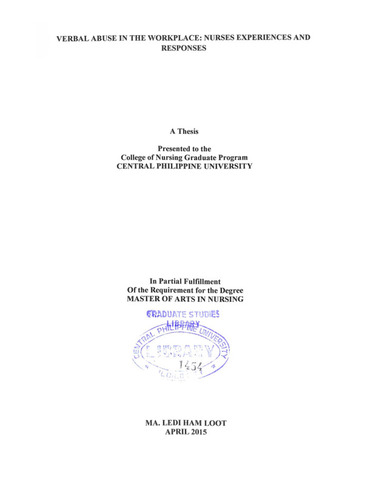| dc.description.abstract | The study was conducted to determine the experiences and responses to verbal abuse of nurses in selected district hospitals in Iloilo. The study further sought to describe the characteristics of staff nurses in terms of age, sex, civil status, educational attainment, employment status, position, and length of work experience. It also aimed to determine the nurses verbal abuse experience, nurses responses to verbal abuse, relationship between nurses characteristics and verbal abuse experience, relationship between nurses characteristics and responses to verbal abuse, and relationship between verbal abuse experience and responses to verbal abuse. The study further aimed to describe the nurses reaction and responses to verbal abuse and the effects / impact of verbal abuse on nurses.
This is a descriptive-relational study that utilized a one shot survey design. This study focused on the verbal abuse experiences of nurses which included type, source and frequency, and their responses to the abuse. In addition, case study was done in order to capture in-depth information that could substantiate the survey. The study was participated by fifty nine (59) staff nurses both contractual and permanent, four supervisors, and two chief nurses in the two district hospitals in the 3rd Congressional District of the Province of Iloilo.
Data were collected using two types of instrument, a structured interview schedule for the survey and an unstructured interview guide for the case study. Descriptive statistics such as frequency distribution, percentages, and mean were utilized to describe the univariate data such as age, sex, civil status, highest educational attainment, employment status, and length of work experience. The data were processed using Statistical Package for Social Sciences (SPSS) version 17. Cramer’s V and Gamma were used to measure relationship among variables.
The nurses were mostly female, 30 years old and below, single, have worked in the hospital for 3 years and above, BSN graduates and contractual staff nurses. The most prevalent type of verbal abuse experienced by the nurses are demeaning/insulting/ shaming and gossiping. The main source of abuse among the nurses is their co-nurses. Answering back or defending self is the most common response of nurses to verbal abuse. The least likely response of nurses to verbal abuse is to report the incident. However, nurses when confronted with verbal abuse experience they would usually respond in a passive way.
A relationship has been found between verbal abuse experience and civil status and employment status. There is a greater likelihood of experiencing verbal abuse if a nurse is married and holding a permanent position. There is also a relationship between demeaning, shaming and shouting type of verbal abuse and civil status, educational attainment, and employment status. Thus, married nurses, with units in Master’s Degree holding a permanent work status have a higher probability of being recipients of demeaning, shaming or shouting type of verbal abuse. The nurse’s experience of intimidating, threatening and harassment may be due to his/ her civil status, educational attainment, length of work experience and employment status. It can be implied that likelihood of being a recipient of threat, harassment or intimidation is higher when a nurse is married, a BSN graduate, working in the institution for 3 years and above and holds a permanent status. A relationship was also found between the experience of derogatory language/name-calling/criticizing/judging and educational attainment, and employment status. This means that a nurse is more prone to name-calling, derogatory language, gossiping, criticizing and judging when she has units in Master’s Degree and holding a contractual status of employment.
Nurses when confronted with verbal abuse will more likely to respond in a passive way. There is a very high relationship between verbal abuse and responses. When a nurse is demeaned, shamed or shouted at, he/ she will likely respond in a passive or emotional manner. Those who experienced intimidating/threatening/harassment would respond in an active aggressive manner. When confronted with derogatory language/name calling, gossiping/ judging/ criticizing, the nurse will mostly respond in a passive way like ignoring, pretending nothing happened smile or no reaction at all. Nurses reported psychological, emotional, social, physical and effects on function as effects of verbal abuse experienced. | en_US |


